The Federal Reserve and Central Banks Announce Exit Plan
Stock-Markets / Financial Markets 2010 Feb 20, 2010 - 08:00 AM GMT (Bloomberg) -- The Federal Reserve’s decision to raise its discount rate shows that the global recovery is on track and other central banks can afford to keep withdrawing emergency measures, former policy makers and economists said.
(Bloomberg) -- The Federal Reserve’s decision to raise its discount rate shows that the global recovery is on track and other central banks can afford to keep withdrawing emergency measures, former policy makers and economists said.
The Fed yesterday raised the rate charged to banks for direct loans by a quarter-point to 0.75 percent, the first increase since June 2006. The Fed said it was a “normalization” of lending that wouldn’t affect monetary policy, and the main federal funds rate would remain low for an “extended period.”
And now…the rest of the story.
The word is out that the Fed will rely on money market funds to help sop up the "excess" liquidity created by the Fed's record shattering explosion of credit.
The Fed has been discussing it's "exit strategy" ever since they pumped huge amounts of credit into the markets since mid-2008. The dilemma, in Ben Bernanke's mind, is that if they tighten credit in an attempt to reduce the volume of "excess" reserves they may quash the recovery. On the other hand, if they don't reduce the credit created they face the specter of inflation, perhaps very high inflation.
The plan is that the Fed will allow money market funds to purchase Treasury debt directly from the Fed, much as do primary dealers. Read “The Fed’s New Plan to Drain the Pond.” Are they “pulling the plug” too soon?
Can the rally continue?
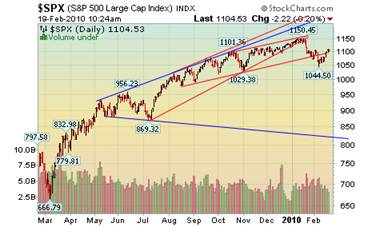 -- Stocks may be entering the “mid-Winter doldrums.” This is a period of weakness that usually happens between Mid-February and late March. Rising interest rates, even symbolically, may expose the market’s vulnerability to an even deeper decline. Speculators have taken on more debt against their positions. Rising interest rates makes the debt more onerous and weakness in speculative assets may cause forced selling.
-- Stocks may be entering the “mid-Winter doldrums.” This is a period of weakness that usually happens between Mid-February and late March. Rising interest rates, even symbolically, may expose the market’s vulnerability to an even deeper decline. Speculators have taken on more debt against their positions. Rising interest rates makes the debt more onerous and weakness in speculative assets may cause forced selling.
Treasury Bond yields may go lower.
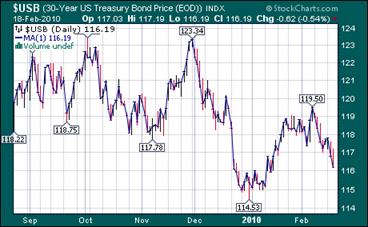 -- Treasuries rose as a government report showed the cost of living in the U.S. increased less than forecast in January, easing speculation the Federal Reserve may raise interest rates soon.
-- Treasuries rose as a government report showed the cost of living in the U.S. increased less than forecast in January, easing speculation the Federal Reserve may raise interest rates soon.
Inflation numbers appear to be subdued, so the Fed doesn’t have a need to raise rates based on inflation yet. The yield curve will be the major driver of rates on the long bond. At this time it may start to flatten as short term yields rise.
The two week gold rally may be finished.
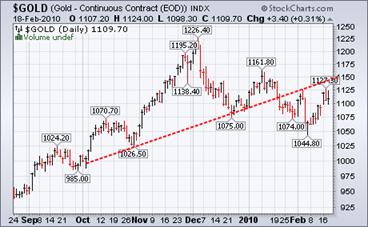 -- Gold futures tallied mild losses Friday after U.S. inflation data for January proved tamer than expected and as traders digested the Federal Reserve's surprise step towards normalized lending.
-- Gold futures tallied mild losses Friday after U.S. inflation data for January proved tamer than expected and as traders digested the Federal Reserve's surprise step towards normalized lending.
The International Monetary Fund announced on Wednesday that it plans to sell 191.3 tons of gold on the open market. Traders are shrugging the news off, since they think that other central banks will be buyers. The chart does not agree.
The Nikkei is very dependent on the U.S. stimulus.
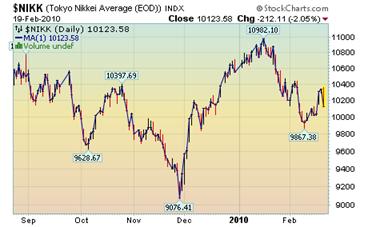 -- Japanese stocks fell the most in two weeks after the Federal Reserve raised the rate it charges banks for direct loans for the first time in more than three years, raising concern economic stimulus programs are being phased out.
-- Japanese stocks fell the most in two weeks after the Federal Reserve raised the rate it charges banks for direct loans for the first time in more than three years, raising concern economic stimulus programs are being phased out.
The Nikkei 225 Stock Average fell 2.1 percent to close at 10,123.58 in Tokyo. The broader Topix index slid 1.7 percent to 889.08, with all of its 33 industry groups retreating. Both gauges had their biggest drops since Feb. 5.
China stocks may still be “bubble bound.”
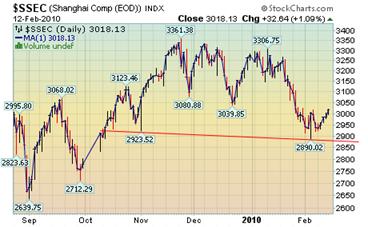 -- China may still be bound for an asset bubble after policy makers ordered banks last week to set aside more deposits as reserves for a second time in a month.The People’s Bank of China said on Feb. 12 the reserve requirement will increase 50 basis points, or 0.5 percentage point, effective Feb. 25. The current level is 16 percent for big banks and 14 percent for smaller ones. Note: the Shanghai market is closed for the Chinese New Year until Monday.
-- China may still be bound for an asset bubble after policy makers ordered banks last week to set aside more deposits as reserves for a second time in a month.The People’s Bank of China said on Feb. 12 the reserve requirement will increase 50 basis points, or 0.5 percentage point, effective Feb. 25. The current level is 16 percent for big banks and 14 percent for smaller ones. Note: the Shanghai market is closed for the Chinese New Year until Monday.
The U.S. Dollar is looking more attractive to investors.
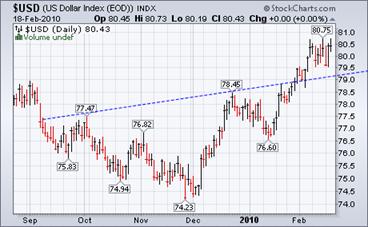 The dollar rose on heightened speculation about the end of stimulus after the Federal Reserve’s decision to raise the discount rate.
The dollar rose on heightened speculation about the end of stimulus after the Federal Reserve’s decision to raise the discount rate.
The fact is, higher interest rates are accretive to the dollar. The European and Japanese central banks don’t dare raise interest rates because their economies are so fragile. This puts the U.S in the position as having the most attractive currency.
Get Over It because there will be no Housing Boom This Decade
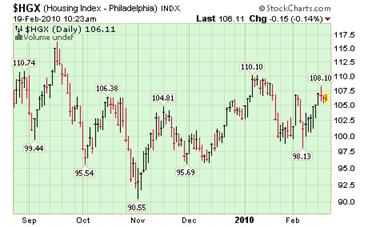 -- In the midst of all the bailouts you might have missed that last month, in perma-bubble Southern California the median price of the entire regional market fell by $17,500. This was the first regional price drop since April of 2009. Now one month doesn’t make a trend of course but if you only listen to the real estate industry and banking cabal you would think that all of a sudden we are circa 2003 real estate. Not by a long shot.
-- In the midst of all the bailouts you might have missed that last month, in perma-bubble Southern California the median price of the entire regional market fell by $17,500. This was the first regional price drop since April of 2009. Now one month doesn’t make a trend of course but if you only listen to the real estate industry and banking cabal you would think that all of a sudden we are circa 2003 real estate. Not by a long shot.
Gasoline prices assume a modest recovery lies ahead.
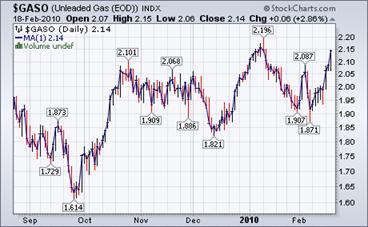 The Energy Information Agency weekly report suggests, “With a modest economic recovery accompanied by some growth in gasoline demand, the Energy Information Administration’s (EIA) Short-Term Energy Outlook forecasts that U.S. net imports of gasoline will rise to 804 thousand barrels per day in 2011. However, with U.S. demand for gasoline expected to grow only slowly, many foreign refiners with excess gasoline may need to look for other export markets.”
The Energy Information Agency weekly report suggests, “With a modest economic recovery accompanied by some growth in gasoline demand, the Energy Information Administration’s (EIA) Short-Term Energy Outlook forecasts that U.S. net imports of gasoline will rise to 804 thousand barrels per day in 2011. However, with U.S. demand for gasoline expected to grow only slowly, many foreign refiners with excess gasoline may need to look for other export markets.”
Is winter loosening its grip on Natural Gas prices?
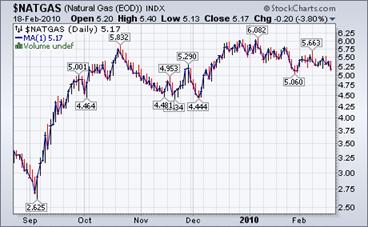 The Energy Information Agency’s Natural Gas Weekly Update reports, “Two major snow storms occurred between February 5 and 10, resulting in significant price increases in the Northeast. On Friday, February 5, the price of natural gas at Transcontinental Pipeline’s Zone 6 location, which serves New York City, jumped to $11.53 per MMBtu, rising by $4.37 compared with the day before. Then prices decreased gradually, ending trading yesterday at $6.18 per MMBtu. Prices also increased in the Midwest and Southeast as a result of colder-than-normal weather for the week ended Wednesday, February 10.
The Energy Information Agency’s Natural Gas Weekly Update reports, “Two major snow storms occurred between February 5 and 10, resulting in significant price increases in the Northeast. On Friday, February 5, the price of natural gas at Transcontinental Pipeline’s Zone 6 location, which serves New York City, jumped to $11.53 per MMBtu, rising by $4.37 compared with the day before. Then prices decreased gradually, ending trading yesterday at $6.18 per MMBtu. Prices also increased in the Midwest and Southeast as a result of colder-than-normal weather for the week ended Wednesday, February 10.
Is the Fed tempting fate?
David Rosenberg from Gluskin Sheff said lending has fallen by over $100bn (£63.8bn) since January, plummeting at an annual rate of 16pc. "Since the credit crisis began, $740bn of bank credit has evaporated. This is a record 10pc decline," he said.
Mr Rosenberg said it is tempting fate for the Fed to turn off the monetary spigot in such circumstances. "The shrinking in banking sector balance sheets renders any talk of an exit strategy premature," he said.
Good-bye inflation, hello deflation?
Mish writes, Inquiring minds are reading Consumer Prices Increase Less Than Anticipated.
The cost of living in the U.S. rose in January less than anticipated and a measure of prices excluding food and fuel fell for the first time since 1982, indicating the recovery is generating little inflation.
The consumer-price index increased 0.2 percent for a fifth straight month, led by higher fuel costs, Labor Department figures showed today in Washington. Excluding energy and food, the so-called core index unexpectedly fell 0.1 percent, reflecting a drop in new-car prices, clothing and shelter.
Traders alert: The Practical Investor is currently offering the daily Inner Circle Newsletter to new subscribers. Contact us at tpi@thepracticalinvestor.com for a free sample newsletter and subscription information.
Our Investment Advisor Registration is on the Web
We are in the process of updating our website at www.thepracticalinvestor.com to have more information on our services. Log on and click on Advisor Registration to get more details.
If you are a client or wish to become one, please make an appointment to discuss our investment strategies by calling Connie or Tony at (517) 699-1554, ext 10 or 11. Or e-mail us at tpi@thepracticalinvestor.com .
Anthony M. Cherniawski,
President and CIO
http://www.thepracticalinvestor.com
As a State Registered Investment Advisor, The Practical Investor (TPI) manages private client investment portfolios using a proprietary investment strategy created by Chief Investment Officer Tony Cherniawski. Throughout 2000-01, when many investors felt the pain of double digit market losses, TPI successfully navigated the choppy investment waters, creating a profit for our private investment clients. With a focus on preserving assets and capitalizing on opportunities, TPI clients benefited greatly from the TPI strategies, allowing them to stay on track with their life goals
Disclaimer: The content in this article is written for educational and informational purposes only. There is no offer or recommendation to buy or sell any security and no information contained here should be interpreted or construed as investment advice. Do you own due diligence as the information in this article is the opinion of Anthony M. Cherniawski and subject to change without notice.
Anthony M. Cherniawski Archive |
© 2005-2022 http://www.MarketOracle.co.uk - The Market Oracle is a FREE Daily Financial Markets Analysis & Forecasting online publication.



